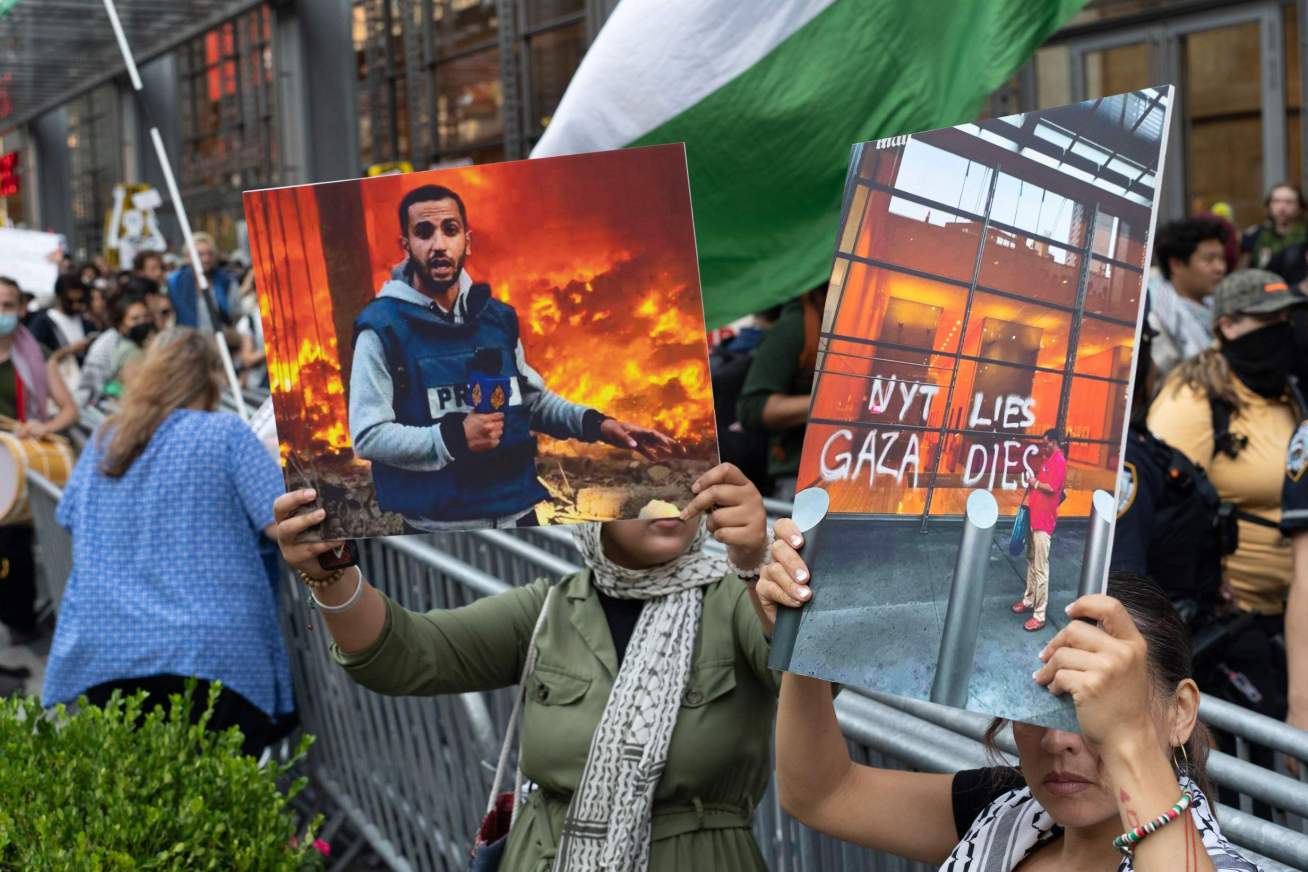
Read our Monthly Magazine
And support our mission to provide fearless stories about and outside the media system
Earlier this week on the BBC News Channel, a presenter blithely asked their guest: “Obviously international organisations like the BBC cannot go in [to Gaza]… so Al Jazeera is using local people there. Are they able to operate truly independently?”
The words “local” and “independently” were doing a lot of heavy lifting in this statement. What is it about being “local”, after all, that must render a journalist irredeemably biased and unable to report accurately? Why are Palestinian journalists forever belittled and subjected to this accusation?
The interview was meant to discuss 28-year-old Palestinian journalist Anas Al Sharif, who had been killed along with the rest of Al Jazeera’s entire Gaza City team, in a targeted Israeli attack on their media tent.

Anas had been reporting bravely since 2023, and Israel produced no convincing evidence for its claim that he was head of a Hamas cell. Nonetheless, a separate BBC presenter on the Breakfast show earlier that day reported: “Anas has been accused by Israel of leading a Hamas cell, something he denied.” There was no caveat around the reliability of Israel as a source.
Between these two BBC presenter quotes, you would be forgiven for thinking that the journalism coming out of Gaza is compromised, and that this is the root of calls to allow international journalists into the strip.
For nearly two years, Israel’s wildest claims have been allowed to gain purchase in mainstream media – repeated by widely trusted outlets like the BBC, Sky, CNN, the New York Times, with little pushback, context, or verification.
Many of these claims have elided both Gaza’s key workers – journalists, doctors, teachers, civil ministers — and its civilian infrastructure of hospitals, schools, homes — with Hamas’ military wing and ongoing operations, positioning them all as legitimate targets.
Little work has been done to make clear that the military and civil wings are separate, or that hospitals and schools are protected under international law. A number of us within the BBC warned the executive that this was dangerous, and that it had to critically engage with every source — including the Israeli military.
My focus here is on journalists in particular, and the work Israel has done to delegitimise them. Israel’s modus operandi – throughout what many aid organisations now call a genocide — has been to claim that a journalist is an active Hamas combatant and kill them, sometimes alongside their whole families. Hossam Shabat. Eman Shanti. Anas Al Sharif. The list goes on.
The blue press vest – an emblem of protection – is now a target in Gaza. The Committee to Protect Journalists says 184 Palestinian journalists and media workers have been killed by Israel since October 2023.
Propping up this claim that journalists in Gaza are largely Hamas combatants is a Western media landscape that refuses to align with Palestinian journalists as credible colleagues, deserving of journalistic protections.
The insinuation behind calling them “local people”, operating with questionable independence, is that they are inherently “biased”: unable to report accurately because they exhibit passion, are close to the story, know the local language, have the trust of their communities, and have specialist knowledge.
These are all skills that, far from obstructing the pursuit of truth, have had clear benefits. A journalist within a community can often uniquely gain the trust of sources, communicate with people on the ground, report on the scene, identify the best stories and angles, and provide cultural context.
Detachment is not the hallmark of good journalism, nor is it treated as such across the board. The same skill set in a white male British journalist – closeness to the story, community knowledge, language skills, bravery in a war zone – would be praised and rewarded.
A weeping white correspondent on the frontlines in Ukraine, wearing a hard hat and press vest, would only be seen as appreciating the true gravity of what they have witnessed, due to their understanding as a specialist. Why should the Palestinian journalist be trusted any less for reporting on the genocide of their own people, while their lives are at constant risk?
“Bias”, then, is a term weaponised against minoritised journalists, whether on the ground or within newsrooms. The disregard for Palestinian journalists in Gaza is echoed in how minoritised journalists are treated in many mainstream newsrooms — accused of breaching impartiality if they show passion or empathy around stories considered politically “controversial”, such as migration, Black Lives Matter, or Gaza.
ENJOYING THIS ARTICLE? HELP US TO PRODUCE MORE
Receive the monthly Byline Times newspaper and help to support fearless, independent journalism that breaks stories, shapes the agenda and holds power to account.
We’re not funded by a billionaire oligarch or an offshore hedge-fund. We rely on our readers to fund our journalism. If you like what we do, please subscribe.
While I worked at the BBC, I myself was told by a senior staff member that it might be time to “let Gaza go” in early 2024, after consistently and passionately pitching stories for months. I was reminded that working at the BBC meant remaining “impartial” — a term that, if it was being wielded in this way, clearly had little to do with doggedly following the evidence.
Emotion is allowed only in certain cases, usually when the victims are white. It is not that passion, specialism, and commitment are undesirable or inherently obstructive to the journalistic pursuit of evidence and truth, but that these skills are penalised and coded as “bias” when they come from minorities.
It is time for mainstream media, and the BBC in particular, to acknowledge the damage of this egregious double standard.
